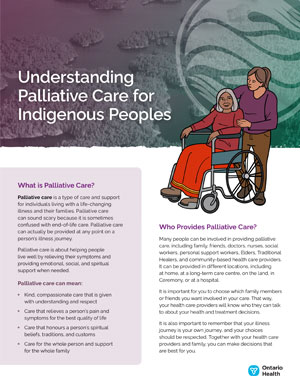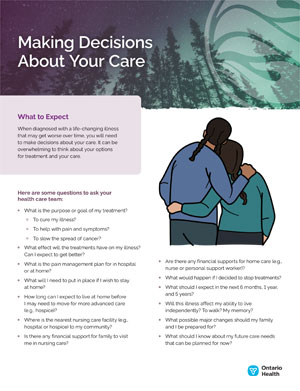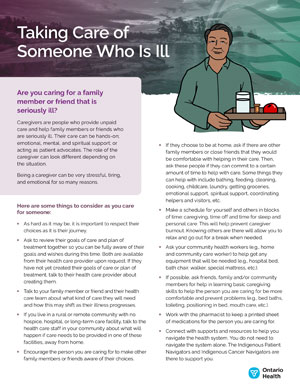Indigenous Palliative Care Fact Sheets
The Indigenous Palliative Care Fact Sheets are developed to support First Nations, Inuit, Métis and urban Indigenous people living with a life-changing illness and their families, caregivers and communities.
There are four Indigenous Palliative Care Fact Sheets.

Understanding Palliative Care for Indigenous Peoples
- This Fact Sheet provides information on what palliative care is, who provides palliative care and the complaint process to follow if culturally safe care is not provided.
There are also sample questions that people and their caregivers can ask to ensure they have the information they need to make decisions about their health. - Understanding Palliative Care for Indigenous Peoples

Making Decisions About Your Care
- This Fact Sheet provides information about the decisions a person may need to make about treatment and care when diagnosed with a life-changing illness. As well, it provides information about advance care planning, goals of care, treatment decisions and information consent.
There are also sample questions that people and their caregivers can ask their health care team for more information on what to expect. - Making Decisions About Your Care

Taking Care of Someone Who Is Ill
- This Fact Sheet provides information for caregivers who are caring for a person that is seriously ill. It provides information on things to consider when caring for someone and ways for the caregiver to take care of their physical, mental, emotional and spiritual wellness.
- Taking Care of Someone Who Is Ill

Support on Your Palliative Care Journey
- This Fact Sheet provides information about support available including:
- Indigenous Cancer Navigators
- Indigenous Patient Navigators
- Non-Insured Health Benefits (NIHB)
- Métis Nation of Ontario: Community Support Services Program
- Ontario Federation of Indigenous Friendship Centres: Life Long Care Program
- Ontario Native Women’s Association: Ska-Be (Helper)
- Supportive Cancer Care Programs
- Support on Your Palliative Care Journey
